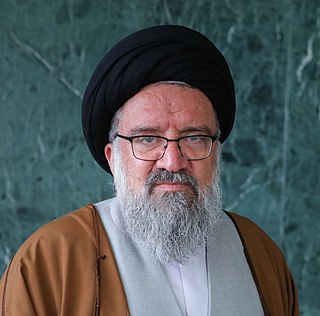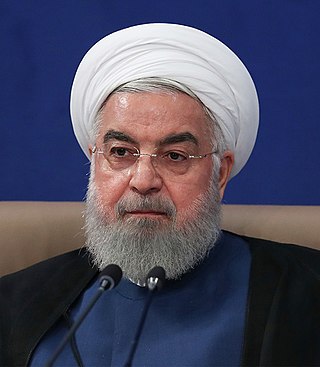
The politics of Iran takes place in the framework of an Islamic theocracy which was formed following the overthrow of Iran's millennia-long monarchy by the 1979 Revolution.

The Guardian Council is an appointed and constitutionally mandated 12-member council that wields considerable power and influence in the Islamic Republic of Iran.

Seyyed Ali Hosseini Khamenei is an Iranian Twelver Shia marja' and politician who has served as the second supreme leader of Iran since 1989. He previously served as third president of Iran from 1981 to 1989. Khamenei is the longest-serving head of state in the Middle East, as well as the second-longest-serving Iranian leader of the last century, after Shah Mohammad Reza Pahlavi.

Ali Akbar Hashemi Bahramani Rafsanjani, commonly known as Hashemi Rafsanjani, was an Iranian politician and writer who served as the fourth president of Iran from 1989 to 1997. One of the founding fathers of the Islamic Republic, Rafsanjani was the head of the Assembly of Experts from 2007 until 2011 when he decided not to nominate himself for the post. He was also the chairman of the Expediency Discernment Council.

The Assembly of Experts, also translated as the Assembly of Experts of the Leadership or as the Council of Experts, is the deliberative body empowered to appoint the Supreme Leader of Iran. All directly elected members must first be vetted by the Guardian Council.

The Constitution of the Islamic Republic of Iran is the supreme law of Iran. It was adopted by referendum on 2 and 3 December 1979, and went into force replacing the Constitution of 1906. It has been amended once, on 28 July 1989. The constitution was originally made up of 175 articles in 12 chapters, but amended in 1989 to 177 articles in 14 chapters.

Sayyid Mahmoud Hashemi Shahroudi was an Iranian-Iraqi Twelver Shia cleric and conservative politician who was the Chairman of the Expediency Discernment Council from 14 August 2017 until his death on 24 December 2018. He was previously the Chief Justice of Iran from 1999 to 2009.

Mohammad Yazdi was an Iranian conservative and principlist cleric who served as the head of Judiciary System of Iran between 1989 and 1999. In 2015, he was elected to lead Iran's Assembly of Experts, defeating Akbar Hashemi Rafsanjani, a former president, by a vote count of 47 to 24.

Iran elects on national level a head of state and the head of government, a legislature, and an "Assembly of Experts". City and Village Council elections are also held every four years throughout the entire country. The president is elected for a four-year term by the citizens. The Parliament or Islamic Consultative Assembly currently has 290 members, also elected for a four-year term in multi- and single-seat constituencies. Elections for the Assembly of Experts are held every eight years. All candidates have to be approved by the Guardian Council. See Politics of Iran for more details.

Ahmad Jannati is an Iranian conservative politician. He was born in Ladan, Isfahan. Jannati is known for his anti-LGBT rhetoric and opposition to secularism. He is also a founding member of the Haghani school of thought.

Ayatollah Mohammad Reza Mahdavi Kani was an Iranian Shia cleric, writer and conservative and principlist politician who was Prime Minister of Iran from 2 September until 29 October 1981. Before that, he was Minister of Interior in the cabinets of Mohammad-Ali Rajai and Mohammad-Javad Bahonar. He was the leader of Combatant Clergy Association and Chairman of the Assembly of Experts and also founder and president of Imam Sadiq University.

Muhammad Taqi Misbah YazdiGiwachi was an Iranian Shia scholar, political theorist and philosopher who served as the spiritual leader of the Front of Islamic Revolution Stability.

Sayyid Ahmad Khatami is a senior Iranian Shia cleric, member of Guardian Council and a senior member of the Assembly of Experts. In December 2005, Ali Khamenei appointed him as Tehran’s substitute Friday prayer leader. He is also a conservative and principlist politician.

Mahmoud Ahmadinejad is an Iranian principlist and nationalist politician who served as the sixth president of Iran from 2005 to 2013. He is currently a member of the Expediency Discernment Council. He was known for his hardline views and nuclearisation of Iran. He was also the main political leader of the Alliance of Builders of Islamic Iran, a coalition of conservative political groups in the country, and served as mayor of Tehran from 2003 to 2005, reversing many of his predecessor's reforms.
Kingdom Assembly of Iran, also The Monarchy Assembly Iran, Soldiers of the Kingdom Assembly of Iran, Iran Monarchy Committee, or Tondar, is a decentralized Iranian monarchist opposition movement, primarily known for its efforts to overthrow the Islamic Republic and restore the Iranian monarchy. The group is currently banned in the Islamic Republic of Iran. Tondar means 'thunder' in Persian.

Sayyid Mojtaba Hosseini Khamenei is an Iranian Shia cleric and son of Ali Khamenei, the Supreme Leader of Iran. He served in the Iran–Iraq War from 1987 to 1988. He also reportedly took control of the Basij militia that was used to suppress the protests over the 2009 election.

The supreme leader of Iran ), also referred to as Supreme Leader of the Islamic Revolution, but officially called the Supreme Leadership Authority, is the head of state and the highest political and religious authority of the Islamic Republic of Iran. The armed forces, judiciary, state radio and television, and other key government organizations such as the Guardian Council and Expediency Discernment Council are subject to the Supreme Leader. According to the constitution, the Supreme Leader delineates the general policies of the Islamic Republic, supervising the legislature, the judiciary, and the executive branches. The current lifetime officeholder, Seyyed Ali Hosseini Khameneh known as Ali Khamenei, has issued decrees and made the final decisions on the economy, the environment, foreign policy, education, national planning, and other aspects of governance in Iran. Khamenei also makes the final decisions on the amount of transparency in elections, and has dismissed and reinstated presidential cabinet appointees. The Supreme Leader is legally considered "inviolable", with Iranians being routinely punished for questioning or insulting him.

Hassan Rouhani is an Iranian Islamist politician who served as the seventh president of Iran from 2013 to 2021. He is also a sharia lawyer ("Wakil"), academic, former diplomat and Islamic cleric. He served as a member of Iran's Assembly of Experts from 1999 to 2024. He was a member of the Expediency Council from 1991 to 2013, and also was a member of the Supreme National Security Council from 1989 to 2021. Rouhani was deputy speaker of the fourth and fifth terms of the Parliament of Iran (Majlis) and Secretary of the Supreme National Security Council from 1989 to 2005. In the latter capacity, he was the country's top negotiator with the EU three, UK, France, and Germany, on nuclear technology in Iran, and has also served as a Shia mujtahid, and economic trade negotiator.
The fifth Iranian Assembly of Experts election were held in Iran on 26 February 2016 to elect the members of the Assembly of Experts. All 88 members of the Assembly of Experts, who are known as mujtahids, are directly elected. The elections had been planned for 2014, but were delayed in order for the election to be held alongside the Islamic Consultative Assembly elections.

The Government of the Islamic Republic of Iran, known simply as Nezam, is the ruling state and current political system in Iran, in power since the Iranian Revolution and fall of the Pahlavi dynasty in 1979.













